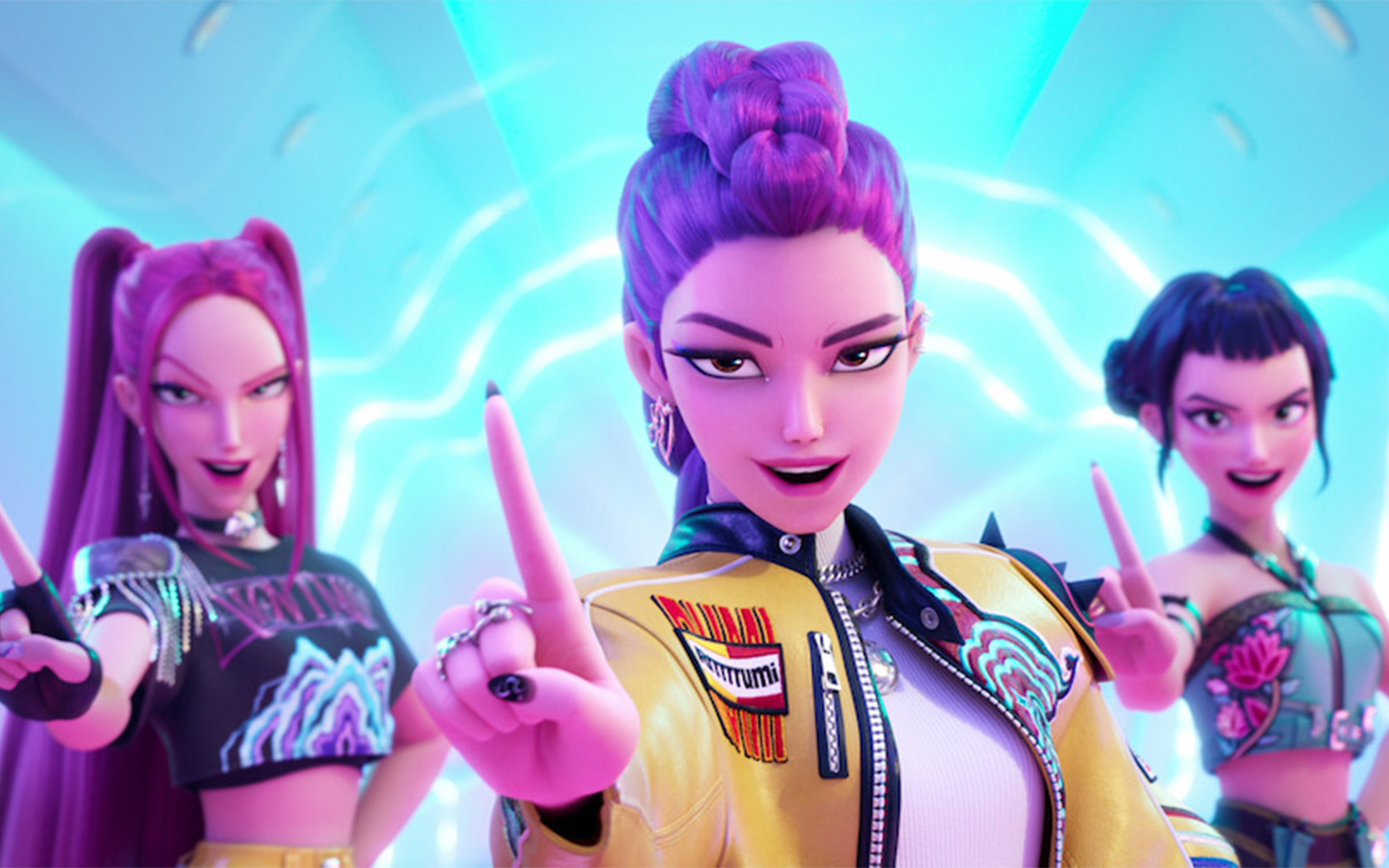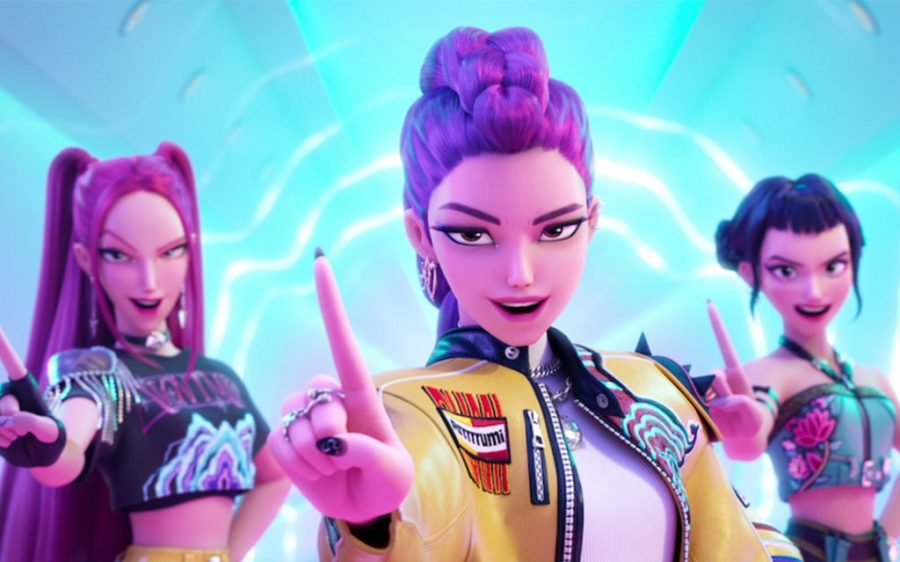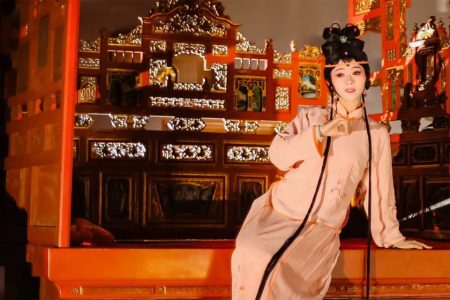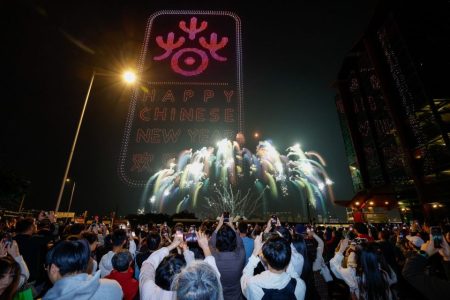When Netflix released the animated film KPop Demon Hunters on 20 June, the streaming giant had probably expected a modest success at best. After all, the Korea-inspired flick was the antithesis of the typical American animated feature on the platform, mashing up genres that normally don’t go together. Even co-director Maggie Kang had reservations, telling CBC that she “honestly didn’t think it was even possible for a movie to be this popular, really.”
Despite the odds, KPop Demon Hunters quickly became a runaway hit upon release, becoming Netflix’s most watched film of all time, racking up 236 million views.
[See more: Everything you need to know about Ne Zha 2, the world’s highest grossing animated film]
The movie’s success hasn’t just been confined to Netflix, as its soundtrack made music history by becoming the first to have four songs on the top ten of the Billboard Hot 100 at the same time. Meanwhile, the film’s hit single “Golden” clinched the top spot on the charts and has already amassed over 471 million streams on Spotify.
To find out what all the hype is about, read on.
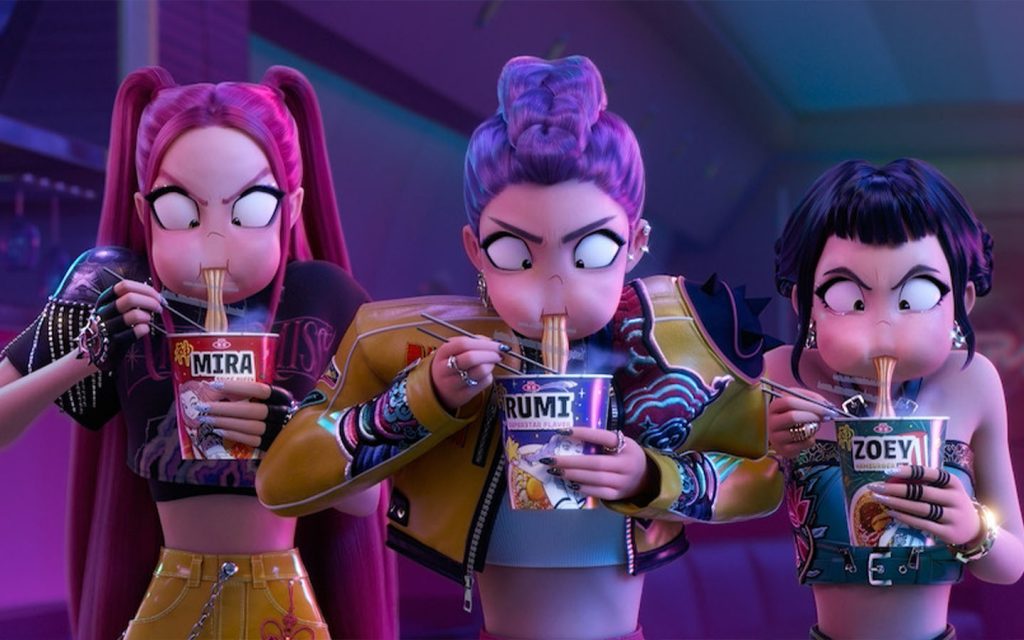
What’s the story of KPop Demon Hunters?
Set in South Korea, Demon Hunters tells the story of the ultra popular K-Pop girl band Huntrix whose three members – Rumi, Mira and Zoey – moonlight as demon hunters. The trio are part of a long line of Korean female demon hunters who have, since antiquity, prevented the demon king, Gwi-Ma, and his monsters from eating souls and invading the human world.
Unable to defeat the hunters, Gwi-Ma enlists the help of the demon Jinu, who establishes a rival boyband called the Saja Boys. Disguised as humans, the band’s five demon members attempt to destroy the hunters by stealing their fans and weakening the barrier protecting the human world from the demon realm.
[See more: What is The Shadow’s Edge, Jackie Chan’s new AI crime film set in Macao?]
To complicate matters further, Huntrix’s lead singer, Rumi, hides the fact that she is half demon from her fellow band members.
Why is this film such a smash hit?
The bonafide success of Demon Hunters wasn’t accidental. While the flick has undoubtedly benefited from hallyu – the global spread of Korean culture since the late 1990s, its popularity can also be attributed to other intrinsic factors. Chief among them is the film’s addictive K-pop soundtrack, which includes hits such as “Golden,” “Free” and “Your Idol.”
Having relatable and complex characters helps as well. Rather than simply depict the three leads as elegant, perfect KPop stars, the directors also expose the characters’ more human side. At one point, Rumi’s voice breaks during rehearsal. Similarly, the girls are unafraid to binge eat, burp, grimace and cry.
[See more: ‘Ballad of a Small Player’ is out soon. Here are 8 other gambling movies to watch beforehand]
In a cinematic landscape populated by superhero flicks and adaptations of preexisting franchises, Demon Hunter also represents a breath of fresh air. Its original and unique blend of KPop music, kid-friendly demon slaying and eye-catching animation and drama makes for a recipe for success.
“It’s really not similar to anything else I’ve seen in my ten years lifetime,” one child fan told CNN. Another said it best when she noted that “there’s a little spark of it that set off my heart whenever I watched it.”
Is this film appropriate for children?
Yes. Netflix recommends the KPop Demon Hunters for viewers aged 10 or over. Younger children will most likely have a pleasant viewing experience as well, as the film has a positive tone and catchy music, although some of the fights involving demons may be frightening to some very young children.
Who are the directors?
KPop Demon Hunters has two directors, Maggie Kang and Chris Appelhans. The idea of the film originated from Korean-Canadian animator Kang, who told the New York Times that her goal was “to make something I wanted to see: a movie that celebrated Korean culture.”
The road to bringing Demon Hunters to the screen was a long one, with Kang mentioning that the entire process from the film’s pitch to its release took around seven years.
Initially, the Korean-Canadian had wanted to offset her workload by collaborating with another female Asian director. She was ultimately unsuccessful in her search, but managed to find a worthy co-director in the form of Appelhans.
[See more: What is Honey Money Phony, the new Chinese scam film that’s set in Macao?]
Although not of Asian-heritage, Appelhans had already shown cultural sensitivity and understanding by travelling to China and working with a Chinese team for his debut animated film Wish Dragon (2021), which was set in China.
“I think that really shows how dedicated he is about respecting a culture and knowing the importance of embracing the talent that brings you that authenticity,” Kang told Time magazine.
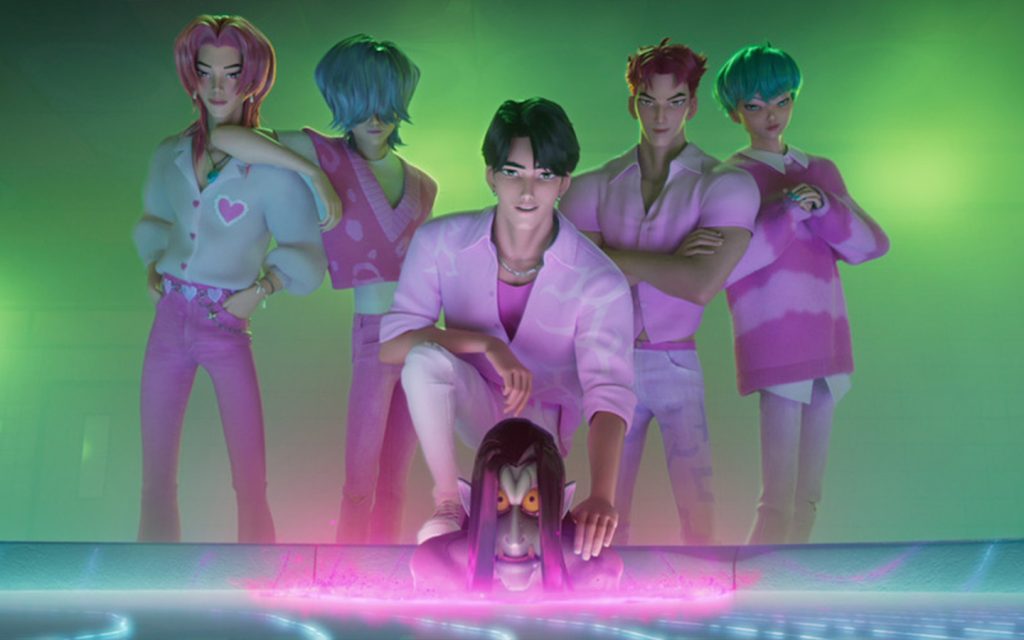
Who are the voice actors?
The lead voice actresses of KPop Demon Hunters include Arden Cho, May Hong and Ji-young Yoo, who voice Rumi, Mira and Zoey.
All three Korean-American actresses have stated that they identify with their characters. Cho, for instance, said that Rumi’s shame over her half-demon heritage reflected her experience growing up as a minority.
“I always felt that being Asian or looking the way I did was something to hide,” Cho said in a Netflix interview. “I hope that girls growing up like me wouldn’t think I want to be someone different, but that they want to be who they are.”
[See more: ‘There is so much AI content nowadays.’ Meet Penny Lam of the Macao International Documentary Film Festival]
Meanwhile, singers Ejae, Audrey Nuna and Rei Ami provide the singing voices of Rumi, Mira and Zoey.
Other notable voice actors include South Korea’s Anh Hyo-seop, who voices the lead singer of the Saja Boys, Jinu. Comedian Ken Jeong (The Hangover) provides the voice of Bobby, the Huntrix’s manager, while Lee Byung-hun (Squid Game) and Daniel Dae Kim (Lost, Hawaii Five-0) play the main villain Gwi-Ma and the side character Healer Han.
What does the film say about KPop and South Korean culture?
KPop Demon Hunters attempts to capture the enthusiasm that Kpop fans have for their favourite bands. Fans are a constant presence throughout the film. The concert scenes, for example, cut between Huntrix and Saja Boy’s performances with the reactions of the fans, who are depicted wearing merchandise and holding glow sticks. Other scenes show them engaged with the music of their idols through social media and fan events.
At the same time, the movie comments on the pressures that Kpop idols face to keep their fans happy. For instance, when Rumi loses for voice, her band has to deal with the fallout from their axed live performance of their new single, which their manager says includes “thousands of disappointed fans” and a network that “is losing their minds.”
[See more: In conversation with Marco Müller: Fostering new talent at Macao’s film festival]
Korean culture is also front and centre in the film. The three leads are depicted enjoying a mixture of Korean food, including kimchi, Pyongyang naengmyeon (a cold noodle dish from North Korea), gimbap (Seaweed rice rolls) and popular Korean snacks such as cup ramyeon, shrimp crackers and fish cake soup and hotteok (sweet pancakes).
Outside of culinary references, KPop Demon Hunters also refers to traditional Korean culture through the characters, Derpy, a blue furred tiger, and Sussie, a three-eyed magpie that dons a traditional Korean hat for male known as a gat. The two characters are an allusion to the tiger and magpie, which were popular subject matters in Korean folk art (minhwa).
What are the critics saying about the film?
Critical reaction to KPop Demon Hunters has been largely positive, with reviewers praising its excellent animation, terrific soundtrack and emotional storyline about accepting one’s identity. On the flip side, the film has been criticised for being predictable and featuring side characters that are underdeveloped.
[See more: Six Studio Ghibli films you can’t miss (plus one bonus)]
Giving the film four out of five stars, Kelechi Ehenulo of Empire magazine said the “joyous energy and fun [demon hunters] has with its concept” make it highly watchable, regardless of whether or not the viewer is a KPop fan. In a positive review, prominent reviewer Mark Kermode described the demon hunters as “weirdly good fun,” comparing the songs that punctuate the film to a “sugar candy rush” that “reaches out all your senses.”
Where can I watch the film?
KPop Demon Hunters is currently available on Netflix in two versions – the standard movie version and a sing-along edition with karaoke-style subtitles during the musical scenes.
The film’s popularity has meant that the film has also had limited theatrical screenings in the US, Canada, UK, Australia and New Zealand on 23 and 24 August.
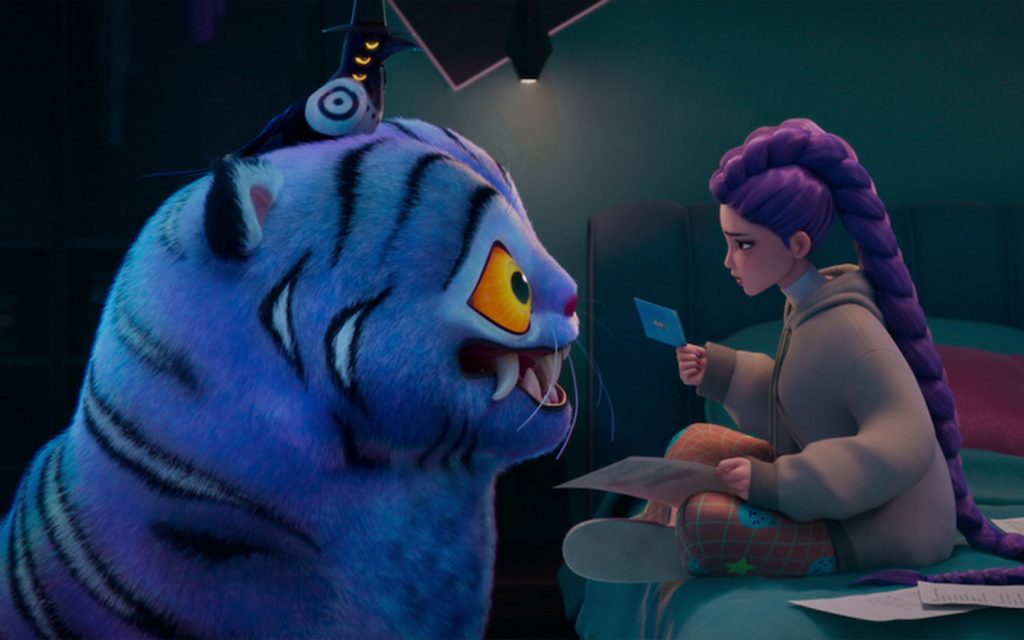
Could KPop Demon Hunters win an Oscar?
While the 98th Academy Awards isn’t until 15 March 2026, that hasn’t stopped fans and the media from discussing demon hunter’s potential to bag a golden statuette. Some have already speculated that the film could become one of the very few anime flicks to receive a nod for best animated feature. Demon Hunters has certainly left a larger cultural footprint than most other animated releases this year, with the exception of China’s box office juggernaut, Ne Zha 2.
[See more: Watch the first trailer for James Cameron’s Avatar: Fire and Ash]
Meanwhile, the wildly popular song “Golden” also has a real shot at winning the best original song award, with Netflix set to submit a nomination to the academy.
Is there going to be a sequel?
According to the Hollywood Reporter, Netflix and Sony Pictures – the studio behind Demon Hunters – are currently discussing the potential of an animated follow-up. Co-director Kang has also vaguely spoken about what a sequel might entail, telling Variety that “there’s a lot of questions that are left unanswered and areas that are not explored” and that the current film focused on “Rumi’s story,” leaving the “backstories for Zoey and Mira” untold.
[See more: Singapore’s Dasmond Koh shares his ambitions for the Golden Singa Awards]
The head of Netflix’s film division, Dan Lin, has also mentioned that his company is “excited to explore what could be the next adventure for Huntrix,” although he stressed that “any future stories” would have to “retain the flair and uniqueness of the first film.”
Aside from sequels, there are reports that Netflix is hoping to capitalise on the success of Demon Hunters with a live-action adaptation and a stage musical.
